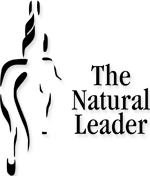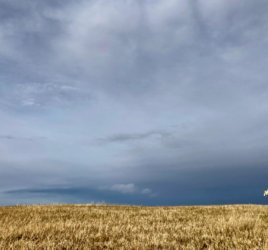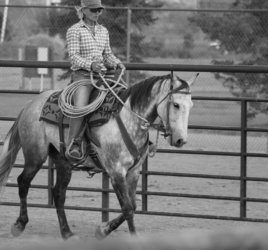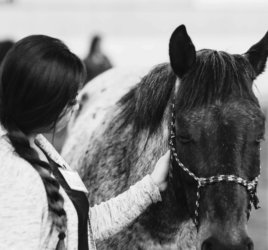December 2019 – Carey awarded one of Canada’s Top 40 under 40. A program that identifies outstanding achievers, visionaries and innovators, changing the way things are done. Congratulations Carey.
—
Horses are sanctuary for the President of Arnett & Burgess Pipeliners.
Carey’s story with horses goes back a long way. When she was seven she brought home a riding lesson brochure and announced she wanted to ride. “My grandfather thought he’d start me off with a month of lessons to see if I was really interested. I never let my parents quit.”
Carey was hesitant on the question about how many horses she has “they’re a little like potato chips you can’t have just one.”
Over the years Carey has competed in a number of different disciplines and her current competitive outlet is Long Distance Riding (Endurance and Competitive Trail).
When Carey is not in the company of a horse, she serves as President of Arnett & Burgess Pipeliners. She is responsible for the day-to-day operations of this 60 year old pipeline construction company her grandfather founded. With seven offices in Western Canada and a growing U.S. business in North Dakota. Carey works with her father, Tom Arnett CEO and her brothers Jamie and Steve are VP Finance and Senior Equipment Manager respectively.
As if that is not enough, Carey is on the board of the Calgary Petroleum Club and Vice Chair of CEPA Canadian Energy Pipeline Association Foundation. With 2 young children and a lot of travel it’s hard to imagine when Carey has time for horses, but she says she couldn’t do everything else without them. Horses are her sanctuary.
———
TNL – What have horses taught you about yourself, about leadership?
CA – Patience wasn’t fundamental to my nature, so training horses taught me patience. I do believe it was training horses that prepared me for work and for kids.
Horses have also taught me that patience and hard work can get you to incredible places. They are never afraid of a little sweat and ambition. Horses are always keen to go further and faster. I really appreciate the view from a mountaintop or from a coulee in the badlands that I didn’t even know existed. Whether it’s work or horses, we might not end up continuing on the trail we started on but with careful navigation and footwork we can still make good miles.
And listening. I don’t think you get very far without listening.
—–
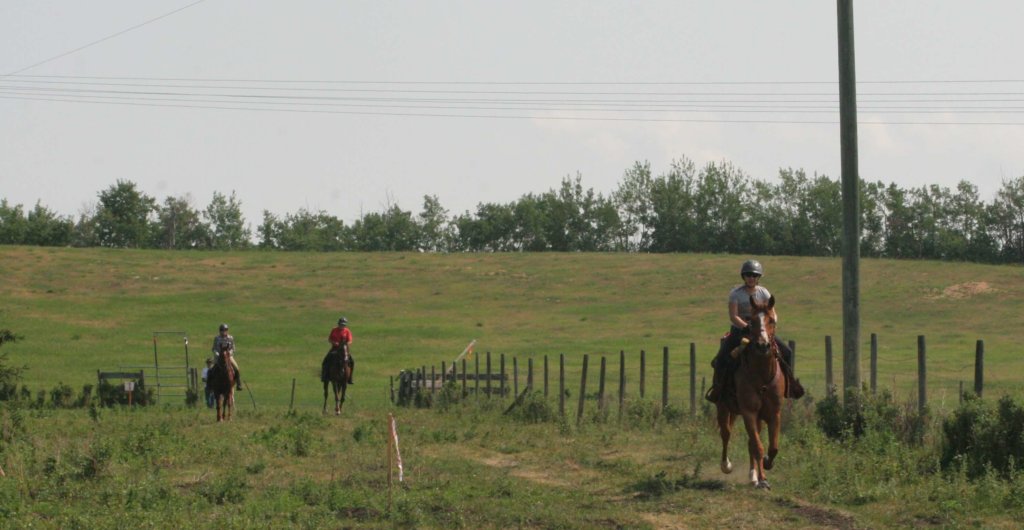
TNL – When you say you learned listening from a horse. What do you mean?
CA- I guess I mean interpreting everything! With horses listening is more of a feeling because it’s about what they do, not what they say. So you need to pay attention to everything, or you can get hurt.
In our pipeline business it’s all about people. So listening and watching helps me pick up the nuances. Sometimes when I hear a problem that a client or my team is having, I might not be able to immediately point them in the right direction. A couple of days later I might come across a possible solution that relates to what I heard. Then it’s easy to share.
Resilience is another one. With a horse if you fall off, conventional wisdom says get back on. Business is a lot like that. It’s rarely a straight path and you have to try different tactics to help navigate through the obscure obstacles in your path.
Honest & Integrity are also so important to what we do. Being able to trust my people to make good decisions. They always won’t make the perfect decision, but I trust them to make the best decision given what they know at the time.
Horses know if those are not your innate qualities. A horse figures you out pretty quickly and if you’re not being fair to the horse, they can become unglued in a heartbeat. Putting your foot in the stirrup for the first time of an 1100lb animal, statistically the most dangerous domesticated animal, takes an immense amount of trust.
I trust my team implicitly. I grew up in the business and have a great team who are all like family. They have earned my trust. The team also needs to trust each other and know that they’re trusted.
If a horse doesn’t come across well in the herd, they can get pretty beat up too. People that aren’t trustworthy don’t last long on a crew.
—–
In November 2017, Carey was invited to be a panel member on a Women in Energy event moderated by Deborah Yedlin. Carey noted there an increasing number of women in the energy industry but very few women in the pipeline construction sector.
One of the questions that inevitably comes up in any all female panel is
“As a women in the energy sector, do you find yourself being treated differently?”
CA – “When I get asked if people treat me differently because I’m a woman I can’t answer that question. I have nothing to compare it to, I don’t know how people treated my father, I only know how they treat me.”
Being on that leadership panel was really interesting for me. Through the discussion we disovered we all had a few things in common. The moderator Deborah Yedlin shared something she lives by that her mother told her “Keep one thing for yourself that was for you, not your husband or your children. Just for you.”
Everyone on that panel had that one thing. It was this escape mechanism that helped us manage the stress of managing hundreds or thousands of people. For me it was horses. Horses are that escape, when I’m in the backcountry (away from the cell phone reception) I can totally relax, horses are my sanctuary.
The other thing we all shared is, we all had a group of longtime friends that we’ve remained close with. Friends that we can share issues with to help navigate the business world, friends that hold us accountable and call BS when they see it.
—–
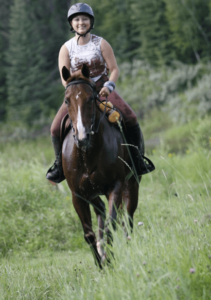 TNL – How have horses impacted your leadership style
TNL – How have horses impacted your leadership style
CA – Horses are pretty humbling. Those aha moments and then you wonder why you didn’t figure it out sooner.
Like starting a colt. There might be a technique that will work with one colt but not another. It’s about creating perspective that allows you to try something different.
Most of the horses I’ve started are Quarter Horses (QH), what I found is what might work for a QH doesn’t work for an Arabian. It’s been interesting for me to see how breed, personality and bringing them up makes a difference. Style and adaptation is key. I have three horses all with very similar breeding but they are three completely different individuals and personalities.
I’m a long ways from figuring out my leadership style but I do believe the horses have helped me see that I like surrounding myself with different perspectives. I believe that is what makes a team healthy.
—–
TNL – Of the different perspectives what is the one thing you would like to share with your team – what is the one thing you wish others could learn?
CA – A herd is a tight knit group– an important team fundamental that we need to stay close and all travel in a similar direction.
If you don’t have patience you can get overly frustrated too quickly. I’ve seen when people are too similar they often can’t hear one another.
If you’re stressed stepping into the stirrup you’re going to have a wreck. Stress is healthy but you need to be able to manage that to be effective.
—–
Starting colts is something we share an interest in and our paths crossed when Carey had both a young colt and very young kids. I was there to help her get a good first ride on the colt. I actually did little, Carey was one of the most capable and handy people I’ve met.
Nancy Lowery has been blogging about her Leadership Learning through Horsemanship Experiences for over ten years. This series began as “One Foot in the Arena” to explore what other leaders in Calgary have learned about their own leadership through their relationships with horses.
To explore how a day with horses can complement your Leadership Training programs Nancy would love to hear from you.
